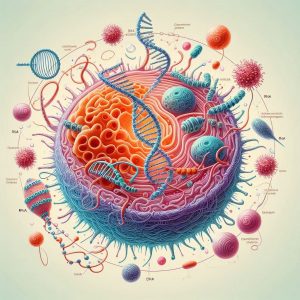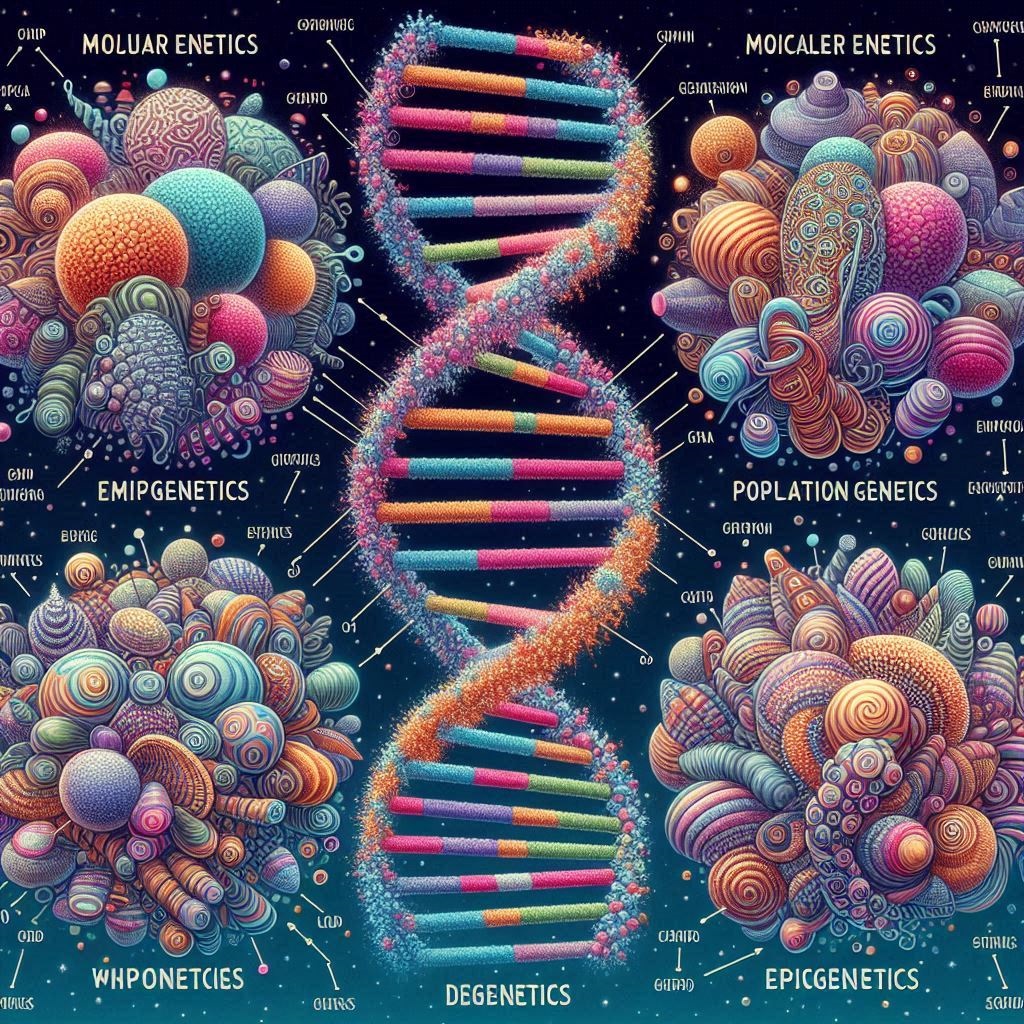Exploring the Three Major Fields in Genetics
Genetics, the study of heredity and the variation of inherited characteristics, is a vast and intricate field. It encompasses numerous subfields, each focusing on different aspects of genetic research and application. In this article, we explore three major fields within genetics: Molecular Genetics, Genomics, and Population Genetics.
Molecular Genetics
Molecular Genetics focuses on the structure and function of genes at a molecular level. It examines how genes are expressed and regulated, and how mutations in genes can lead to disease. This field involves the study of DNA, RNA, and protein synthesis.
Molecular Genetics encompasses several key concepts that are crucial for understanding how genes function and how genetic information is processed within cells. These concepts include:
1. Gene Expression
Gene expression refers to the process through which genetic information encoded in DNA is translated into functional proteins. This process involves several steps:
- Transcription: The DNA sequence of a gene is copied into messenger RNA (mRNA) by RNA polymerase.
- RNA Processing: The mRNA undergoes modifications, such as splicing and adding a 5′ cap and a poly-A tail, before being transported to the cytoplasm.
- Translation: The mRNA sequence is translated into a specific protein sequence by ribosomes in the cytoplasm.

2. Genetic Mutations
Genetic mutations are changes in the DNA sequence that can lead to alterations in gene function. These mutations can be classified into several types:
- Point Mutations: A single nucleotide change in the DNA sequence, such as a substitution, insertion, or deletion.
- Frameshift Mutations: Insertions or deletions of nucleotides that shift the reading frame of the mRNA, potentially leading to a nonfunctional protein.
- Chromosomal Mutations: Larger-scale changes affecting chromosome structure, such as duplications, deletions, inversions, or translocations.
3. Gene Regulation
Gene regulation refers to the mechanisms that control the activity of genes, ensuring that genes are expressed at the right time and in the right amount. Key elements of gene regulation include:
- Promoters and Enhancers: DNA sequences that control the initiation of transcription by interacting with transcription factors.
- Transcription Factors: Proteins that bind to specific DNA sequences and regulate the transcription of genes.
- Epigenetic Modifications: Chemical modifications to DNA or histones that can influence gene expression without changing the DNA sequence.

Applications of Molecular Genetics
Molecular Genetics has numerous applications in medicine, research, and biotechnology. Some notable applications include:
1. Genetic Disease Diagnosis
Molecular genetics techniques are used to diagnose genetic disorders by identifying mutations in patients’ DNA. Techniques such as PCR (Polymerase Chain Reaction) and sequencing are commonly employed for this purpose.
2. Gene Therapy
Gene therapy aims to treat or cure genetic diseases by correcting or replacing defective genes. This approach holds the potential to address a wide range of genetic disorders, including inherited diseases and some types of cancer.
3. Personalized Medicine
Personalized medicine involves tailoring medical treatments to individual genetic profiles. By understanding a patient’s genetic makeup, healthcare providers can select treatments that are more effective and have fewer side effects.
| Application | Description |
|---|---|
| Genetic Disease Diagnosis | Identification of genetic mutations using molecular genetics techniques. |
| Gene Therapy | Treatment of genetic diseases by correcting defective genes. |
| Personalized Medicine | Tailoring medical treatments based on individual genetic profiles. |
Molecular Genetics is a dynamic and essential field that provides deep insights into the mechanisms of gene function and regulation. Its applications in diagnosing genetic disorders, developing gene therapies, and advancing personalized medicine underscore its importance in modern science and healthcare.
Key Areas of Molecular Genetics
- Gene Expression: Understanding how genes are turned on and off in cells.
- Genetic Mutations: Investigating changes in DNA sequences that can lead to genetic disorders.
- Gene Regulation: Studying the mechanisms that control gene activity.
| Key Topic | Description |
|---|---|
| Gene Expression | The process by which genetic information is transcribed and translated into proteins. |
| Genetic Mutations | Alterations in DNA sequences that can affect genetic functions and lead to diseases. |
| Gene Regulation | Mechanisms that control the timing and amount of gene expression. |
Genomics
Genomics involves the comprehensive study of genomes, the complete set of DNA in an organism. This field aims to understand the structure, function, and evolution of genomes. It includes sequencing and analyzing the entire genome to identify genetic variations and their implications.
Key Areas in Genomics
Genomics is a broad field with several key areas of focus:
1. Structural Genomics
Structural genomics aims to characterize the physical structure of the genome. This includes mapping and sequencing the entire DNA sequence of an organism. Advances in sequencing technologies have made it possible to sequence genomes rapidly and cost-effectively.
2. Functional Genomics
Functional genomics focuses on understanding the functions and interactions of genes and proteins. This area of genomics aims to determine how genes and proteins contribute to phenotypes and biological processes.
3. Comparative Genomics
Comparative genomics involves comparing the genomes of different species to identify similarities and differences. This comparative analysis can reveal insights into evolutionary relationships and the functions of genes conserved across species.
4. Epigenomics
Epigenomics studies the chemical modifications to DNA and histone proteins that regulate gene expression without altering the DNA sequence. These modifications, known as epigenetic changes, play a crucial role in development, disease, and environmental responses.
Applications of Genomics
Genomics has numerous applications in medicine, agriculture, and environmental science. Some notable applications include:
1. Precision Medicine
Precision medicine uses genomic information to tailor medical treatments to individual patients. By understanding a patient’s genetic makeup, healthcare providers can develop personalized treatment plans that improve outcomes and minimize adverse effects.
2. Agricultural Improvement
Genomics is used to enhance crop and livestock production. By identifying genes associated with desirable traits, scientists can develop genetically modified organisms (GMOs) with improved yield, disease resistance, and nutritional value.
3. Environmental Genomics
Environmental genomics studies the genetic composition of environmental samples to monitor biodiversity, track the spread of pathogens, and understand ecosystem dynamics. This information is critical for conservation efforts and environmental management.
| Application | Description |
|---|---|
| Precision Medicine | Using genomic information to personalize medical treatments. |
| Agricultural Improvement | Enhancing crops and livestock through genomic techniques. |
| Environmental Genomics | Studying genetic composition of environmental samples for monitoring biodiversity and ecosystem dynamics. |
Future Directions in Genomics
The field of genomics is rapidly evolving, with ongoing research aiming to address some of the most challenging questions in biology and medicine. Future directions include:
1. Whole Genome Sequencing
Advances in sequencing technology are making whole genome sequencing more accessible. This will enable more comprehensive studies of genetic variation and its impact on health and disease.
2. Single-Cell Genomics
Single-cell genomics allows researchers to study the genetic material of individual cells. This approach can provide insights into cellular diversity and the genetic basis of cell function and development.
3. Synthetic Genomics
Synthetic genomics involves designing and constructing new genetic sequences and organisms. This field has the potential to create novel bioengineered solutions for medicine, industry, and environmental management.
Genomics is a transformative field that has significantly advanced our understanding of biology and genetics. Its applications in medicine, agriculture, and environmental science have profound implications for improving human health, food security, and environmental sustainability. As technology continues to evolve, genomics will undoubtedly play an even more critical role in addressing the challenges of the future.
| Key Topic | Description |
|---|---|
| Genome Sequencing | Techniques used to determine the complete DNA sequence of an organism’s genome. |
| Functional Genomics | Research aimed at understanding gene functions and interactions. |
| Comparative Genomics | Analysis of genomic similarities and differences between species. |
Population Genetics
Population Genetics studies the distribution and changes of allele frequencies within populations. This field helps in understanding how genetic variation is maintained and how evolutionary processes such as selection and genetic drift affect populations.
Key Areas of Population Genetics
- Genetic Drift: The change in allele frequencies due to random sampling effects.
- Gene Flow: The transfer of genetic variation from one population to another.
- Natural Selection: The process through which traits that enhance survival and reproduction become more common in a population.
| Key Topic | Description |
|---|---|
| Genetic Drift | Random changes in allele frequencies that occur in small populations. |
| Gene Flow | The movement of genes between populations through migration. |
| Natural Selection | The process by which traits that enhance survival and reproduction are favored. |
Key Concepts in Population Genetics
Several fundamental concepts form the basis of population genetics:
1. Allele Frequencies
Allele frequencies refer to how common a particular allele is in a population. These frequencies can change over time due to evolutionary forces. Understanding allele frequencies helps scientists predict genetic diversity and potential evolutionary paths of populations.
2. Genetic Drift
Genetic drift is the random fluctuation of allele frequencies in a population, which can lead to significant changes in genetic variation over generations, especially in small populations. This random process can cause alleles to become more or less common independently of their selective advantage.
3. Natural Selection
Natural selection is the differential survival and reproduction of individuals due to differences in phenotype. It acts on genetic variation by increasing the frequency of beneficial alleles and decreasing the frequency of harmful ones, driving adaptation to the environment.
4. Gene Flow
Gene flow, or migration, is the transfer of genetic material between populations. It can introduce new alleles to a population, thereby increasing genetic diversity and potentially altering allele frequencies.
5. Mutation
Mutations are changes in the DNA sequence that can create new alleles. These new alleles can be beneficial, neutral, or harmful, and their introduction into a population provides the raw material for evolution.
Applications of Population Genetics
Population genetics has a wide range of applications in various fields:
1. Conservation Biology
In conservation biology, population genetics is used to assess the genetic diversity of endangered species and design strategies for their preservation. Maintaining genetic diversity is crucial for the long-term survival and adaptability of species.
2. Medicine
Population genetics informs the study of genetic diseases and the development of personalized medicine. By understanding the genetic makeup of populations, researchers can identify disease-causing genes and tailor treatments to specific genetic profiles.
3. Agriculture
In agriculture, population genetics helps in breeding programs to develop crops and livestock with desirable traits such as disease resistance, improved yield, and environmental adaptability. Understanding genetic variation in plant and animal populations enables the optimization of breeding strategies.
| Application | Description |
|---|---|
| Conservation Biology | Assessing genetic diversity for the preservation of endangered species. |
| Medicine | Informing the study of genetic diseases and personalized medicine. |
| Agriculture | Enhancing breeding programs for crops and livestock. |
Future Directions in Population Genetics
The field of population genetics continues to evolve with advancements in technology and research. Future directions include:
1. Genomic Technologies
Advances in genomic technologies, such as next-generation sequencing, allow for more detailed and comprehensive studies of genetic variation within and between populations. These technologies are revolutionizing the way population genetics research is conducted.
2. Integrative Approaches
Integrative approaches that combine population genetics with other fields, such as ecology and evolutionary biology, are providing deeper insights into the genetic basis of adaptation and speciation. These interdisciplinary studies are essential for a holistic understanding of biological diversity.
3. Conservation Genomics
Conservation genomics is an emerging field that applies genomic tools to conservation biology. This approach aims to enhance conservation efforts by providing detailed genetic information that can guide management strategies and improve the effectiveness of conservation programs.
Population genetics is a vital field that enhances our understanding of genetic variation and its role in evolution and adaptation. Its applications in conservation, medicine, and agriculture highlight its importance in addressing global challenges. As technology advances, population genetics will continue to provide valuable insights into the genetic foundations of biodiversity and the mechanisms driving evolutionary change.
Conclusion
The fields of Molecular Genetics, Genomics, and Population Genetics each provide unique insights into the complex world of genetics. By exploring these areas, scientists can advance our understanding of genetic functions, variations, and evolutionary processes. Each field contributes to a broader knowledge base that is crucial for advancements in medicine, agriculture, and evolutionary biology.
FAQs in Molecular Genetics
**Q1: What is molecular genetics?**
A: Molecular genetics is the field of biology that studies the structure and function of genes at a molecular level, including how genes are inherited, expressed, and regulated.
**Q2: How is molecular genetics different from classical genetics?**
A: While classical genetics focuses on the inheritance of traits through generations, molecular genetics delves into the biochemical nature of genes, their mutations, and the molecular mechanisms by which they influence traits.
FAQs in Genomics
**Q1: What is genomics?**
A: Genomics is the study of the entire genome of an organism, including the structure, function, evolution, and mapping of all its genes.
**Q2: How does genomics impact medicine?**
A: Genomics has revolutionized medicine by enabling personalized treatments based on an individual’s genetic makeup, identifying genetic predispositions to diseases, and developing targeted therapies.
FAQs in Population Genetics
**Q1: What is population genetics?**
A: Population genetics studies the distribution and change in frequency of alleles within populations, and how evolutionary forces such as natural selection, genetic drift, mutation, and gene flow influence genetic variation.
**Q2: Why is population genetics important for conservation?**
A: Population genetics helps in understanding the genetic diversity within endangered species, which is crucial for developing effective conservation strategies to ensure their survival and adaptability.
Disclaimers
Disclaimers in Molecular Genetics
The information provided in molecular genetics studies is based on current research and understanding. As scientific knowledge evolves, new discoveries may alter the interpretation and application of genetic data. Always consult updated resources and professional guidance for critical decision-making. The information provided in this article is for educational purposes only and is not intended as a substitute for professional advice or scientific research.
Disclaimers in Genomics
Genomic data interpretation and its applications in medicine and other fields are continually advancing. The outcomes of genomic studies should be considered as part of a comprehensive approach to healthcare and not as definitive diagnoses. Professional medical advice should always be sought.
Disclaimers in Population Genetics
Population genetics research involves statistical analysis and modeling, which are subject to limitations and assumptions. The results should be interpreted in the context of these constraints and complemented with other scientific data for robust conclusions.
Cautions
Cautions in Molecular Genetics
Genetic information is sensitive and personal. Ensure that genetic testing and data handling comply with ethical standards and privacy regulations. Genetic counseling is recommended to understand the implications of genetic test results fully.
Cautions in Genomics
The use of genomic information must be approached with caution, considering the potential psychological, social, and ethical impacts. Informed consent and transparency in how genomic data is used and shared are paramount to protect individuals’ rights.
Cautions in Population Genetics
Population genetics studies can have significant implications for conservation, healthcare, and public policy. Careful consideration of ethical issues and potential unintended consequences is essential. Collaboration with interdisciplinary teams can enhance the responsible application of population genetics research.



